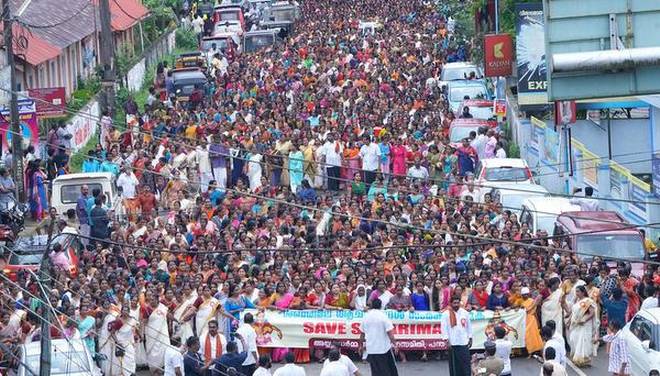The Supreme Court judgment on Sabarimala temple has changed the mindset of millions of Hindus of Kerala, and thankfully this time the mindset has changed in the right direction. Thousands of Hindus from Kerala took to the streets in September and are planning to do more in the coming days to peacefully protest against the Supreme Court verdict which lifted the ban on entry of women from the age group of 10-50 years into the Sabarimala temple. It is interesting to note here that the processions take out in the protest had women devotees whose number equalled the number of men in the ‘Nama Japa Yathra’ or simply the Name Recital Journey. The women too had joined ranks with men to protest against the Supreme Court verdict which broke the ages old ritual of the Sabarimala temple. Thousands of women from Kerala also took to Twitter and other social media platforms with placards saying #ReadytoWait signalling their protest against the attack on the ages old custom by the SC judgement.
No slogans, No Dramas, No violence
Just chanting Ayyappa Mantras
These women will create history
Those who orchestrated against Hindus will repent#SaveSabarimala #ReadyToFight 4 #ReadyToWait pic.twitter.com/bMgAoqZjDc
— HKupdate (@HKupdate) October 2, 2018
These rallies and protest marches signal that the Hindu residents of Kerala have finally started taking an interest in protecting their culture and traditions. The problem with Hindus in Kerala was that they had remained disunited in the largely communist state for a long period of time. The judgement on Sabarimala temple from the SC has proved to be a blessing in disguise for it has united men and women from all the sections of Kerala Hindus. It has proved to be a cohesive force which has bound them together with force; the devotees of Ayyappa, both men and women have clarified through their reply to the verdict that celebrating and respecting diversity is not equal to inequality or discrimination. The Supreme Court verdict on Sabarimala Temple seems like a product of judicial activism rather than an objective verdict based on logic, evidence and conscious effort to refrain from involvement in the matters of the sacred and faith.
The Hindu women #SaveSabarimala #ReadytoWait pic.twitter.com/JMI9fNLsWf
— Armchair Groundworks (@Kuvalayamala) October 2, 2018
A woman leading the processions against the Supreme Court verdict is a tight slap on the face of the people who wanted to present this as a case of inherent discrimination present in Hinduism. The women protesting on the roads and on social media are proof enough that the judiciary should not interfere in matters of faith. This same sentiment was presented by dissenting SC Justice Indu Malhotra who said, “Issues of deep religious sentiments should not ordinarily be interfered by the Court. Notions of rationality cannot be brought into matters of religion.” She also observed, “What constitutes essential religious practice is for the religious community to decide, not for the court. India is a diverse country. Constitutional morality would allow all to practise their beliefs. The court should not interfere unless if there is any aggrieved person from that section or religion.” The Supreme Court verdict on Sabarimala temple ignored the sentiments of the devotees and their customs. The whole debate was shifted from traditions to equality for womankind, all the talks, debates, and discussion were focused solely on the rights of women. However, there was hardly any talk about rights of the Deity inside Sabarimala. This is exactly where the judgement goes wrong; Hinduism is not a Abrahamic religion and it does not have the rigidity or separate customs for men and women. It does not discriminate between the two sexes in the manner which the Abrahamic religions prescribe and that is exactly why today the Hindu women of Kerala have risen up to protect the rights of their deity, Ayyappa which was unjustly being denied to him by the SC verdict.
